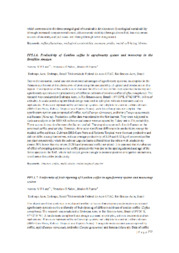Productivity of Conilon coffee in agroforestry system and monocrop in the Brazilian Amazon.
Productivity of Conilon coffee in agroforestry system and monocrop in the Brazilian Amazon.
Autoria: LUNZ, A. M. P.; SALES, F. de; FIAME, J. B.
Resumo: Due to the economic, social and environmental advantages of agroforestry systems, its adoption in the Amazon can be one of the alternatives of promoting the sustainability of agricultural production in this region. The objective of this work was to evaluate the effect of two coffee crop systems (monocrop and agroforestry system) on the productivity of different cultivars of conilon coffee (Coffea canephora). The research was conducted at Embrapa Acre, in Rio Branco-Acre, Brazil (10º1'30"S, 67º42'18"W, 160 m of altitude). A randomized complete block design was used in split plot, with six treatments and six replications. Plots were represented by coffee crop systems and subplots by conilon coffee cultivars (BRS-Ouro Preto, Robusta Tropical and Espirito Santo), with 14 coffee plants per subplot. The agroforestry system was composed of coffee, açaí (Euterpe oleraceae), andiroba (Carapa guianensis) and banana (Musa sp). Production coffee data was related to the first harvest. They were subjected to variance analysis in the SISVAR software and means were compared by Tukey test at 5% probability. There was no interaction between the factors studied. The cropping systems had no influence on the processed coffee productivity. However, there were significant differences in productivity among the studied coffee cultivars. Cultivars BRS-Ouro Preto and Robusta Tropical were the most productive and did not differ among themselves, with an average productivity of 0.59 and 0.52 kg of processed coffee per plant respectively; while the cultivar Espirito Santo differed from the others with productivity almost 50% lower than the others (0.28 kg of processed coffee per plant). It is assumed that the absence of effect of cropping systems on the coffee productivity was due to the spacing adopted and age of the forest species in the SAF, which had not yet grown enough to promote positive or negative interactions, to influence the coffee productivity.
Ano de publicação: 2014
Tipo de publicação: Resumo em anais e proceedings
Unidade: Embrapa Acre
Palavras-chave: Amazônia brasileira, Café conilon, Produtividade, Sistema agrofloretal em monocultivo
Observações
1 - Por padrão são exibidas publicações dos últimos 20 anos. Para encontrar publicações mais antigas, configure o filtro ano de publicação, colocando o ano a partir do qual você deseja encontrar publicações. O filtro está na coluna da esquerda na busca acima.
2 - Para ler algumas publicações da Embrapa (apenas as que estão em formato ePub), é necessário ter, no celular ou computador, um desses softwares gratuitos. Sistemas Android: Google Play Livros; IOS: iBooks; Windows e Linux: software Calibre.
Acesse outras publicações
Acesse a Base de Dados da Pesquisa Agropecuária (BDPA) para consultar o acervo completo das bibliotecas da Embrapa.

